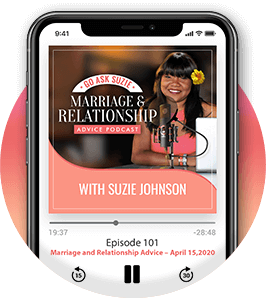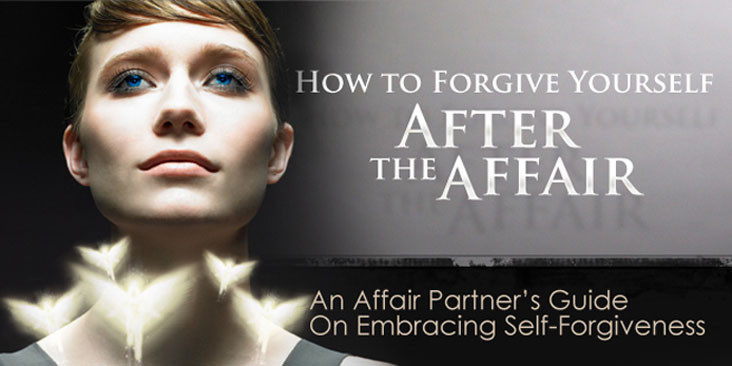![]() Dear Suzie, Two months ago, I had an affair with a married man who goes to my church. I knew what I was doing was wrong, but I felt so madly in love with him. I threw caution to the wind and went ahead anyway. Now that it’s over, I feel deeply ashamed. I can’t seem to forgive myself. I used to be one of those women who condemned other women who slept with married men, so how can I now forgive myself when I knew what I was doing was wrong even before I did it? – Emily
Dear Suzie, Two months ago, I had an affair with a married man who goes to my church. I knew what I was doing was wrong, but I felt so madly in love with him. I threw caution to the wind and went ahead anyway. Now that it’s over, I feel deeply ashamed. I can’t seem to forgive myself. I used to be one of those women who condemned other women who slept with married men, so how can I now forgive myself when I knew what I was doing was wrong even before I did it? – Emily
![]() Here’s the thing about mistakes Emily…
Here’s the thing about mistakes Emily…
Human beings have the tendency to make them, both intentionally and accidentally. Just because you knew ahead of time that having an affair with a married man is wrong, it doesn’t mean it wasn’t a mistake. But before you can allow yourself to make peace with what happened, you must become clear on the answer to one important question.

What is a mistake?
Here’s my definition: A mistake is any action, decision, or choice that fails to produce the right results.
Could it really be that simple?
I think so. You see, Emily, after nearly 10 years of helping people find happiness after infidelity, I’ve come to believe that no one gets involved in an extramarital affair without first believing that taking that wrong turn would eventually lead to something good. This means on some level, even as you took that wrong action, there was a part of you that was convinced it would somehow turn out right (or at least okay). But you might wonder, how could that be true? Because as you said, you knew ahead of time that falling in love with a married man was a bad idea.
As you clearly stated in your email, you were well aware there would be penalties for playing this type of game. So, my question to you is this: were you aware that when you play any game that involves deception and dishonesty, there is no way you can win?
Alas, some of us go into denial, and mistakenly assume that the laws of natural consequences somehow don’t apply to them.
This is why for example:
- People overeat and convince themselves it won’t make them unhealthy.
- People procrastinate and deny that they’re sabotaging themselves .
- People live above their means, bury their heads in the sand and pretend it won’t catch up to them eventually.
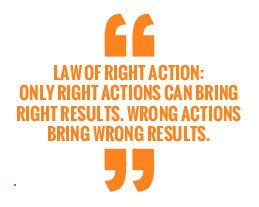
However…
The law of natural consequences makes no exceptions. (Never, ever, ever.)
Consider the following example.
Suppose you were to step off the Empire State Building without a parachute. What would happen? That’s right. You would be headed straight down, wouldn’t you? This is because the law of gravity is absolute, whether you’re a saint or a sinner.
Guess what? The law of right action works the same way.
When you decide to take a wrong action, you’re also deciding to get a wrong result. The two are attached like Siamese twins. In other words, the act of deciding to have an affair (even when you knew better) is bound to produce wrong results, regardless of whether you were in love or not.
And that’s the point I want you to understand here. Your feelings are what led you to believe that you could take wrong actions (throw caution to the wind, go against your principles, and indulge in an extramarital affair) and still have everything come out OK. But just like the law of gravity is no respecter of feelings, the law of right action is no respecter of feelings. So the only real mistake you made was in assuming that you could take a wrong action and somehow get a right result. (That’s impossible.)
Now, let’s talk about embracing forgiveness.
First things first. You need to realize that embracing forgiveness is a process, not a single event. There are steps that must be taken. But it’s not enough just to take the steps. You must also take them in the right order. Just like you wouldn’t build a house by putting up the roof before putting up the walls, when it comes to forgiveness, taking the right steps in the right order matters.
So, let’s begin with first steps first.
4 Steps to Self-Forgiveness After the Affair


Become Aware
Right now, a part of your mind believes your actions are unforgivable. It seems that you’re more disturbed by the act of sleeping with someone who’s married than by the feelings and decisions that preceded the decision to sleep with someone who’s married.
That’s what we call putting the emphasis on the symptoms, not the cause.
Let me explain.
Contrary to popular opinion, I believe infidelity begins with an excuse, not an opportunity. You see, for most people, the road to infidelity begins long before sex is ever involved. In fact, most people who have affairs find the sexual experience to be the culmination, not the inciting event.
Unfortunately, many people have this timeline backwards.
They see the “sex” as the inciting event, rather than the culminating event. Because of this “upside-down thinking,” they place the emphasis on the wrong things and end up having a difficult time embracing forgiveness.
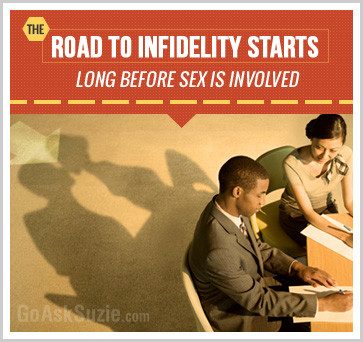
But today, you can change all that.
Let’s do a simple thought experience.
(Are you willing? Good.)
Here’s what I want you to do.
Clear your mind and think back with me for a moment and ask yourself the following question: can you remember the thought that allowed you to rationalize that having an affair (something you knew to be wrong) could end up being OK with you?
Don’t just blow this question off.
I want you to stop reading for 2-3 minutes and allow yourself to truly go inside and think about that question.
Welcome back. What did you discover?
If you’re like most people, and you’re able to work backwards along the affair timeline, you should have been able to distinguish two distinct moments.
Moment #1: A time when having an affair was not okay with you
Moment #2: A time when having the affair became okay in your mind
So, what happened between moments one and two?
How did you make that shift? How did you go from feeling one way to making a 180-degree turn to feeling exactly the opposite?
What created that change of heart?
Going back to something you said in your email, some part of your mind knew that going through with this affair was wrong. I consider this part of your mind to be the rational, common sense part. This is the part that intuitively knows that the law of right action can’t be violated without penalties. And yet, you were somehow able to override this part of your mind and go against your own common sense.
Have you ever wondered what it was that allowed you to do that? (We’ll talk more about that in step two.)
For now, here’s something I want you to understand:
Beneath the surface of your “common sense world” exists another world. It’s the world of your emotions.
Emotions are very powerful.
In fact, I believe (and you’ll hear me say this over and over again) that when it comes to extramarital affairs, the number one thing everybody underestimates is emotions. And yet, certain emotions have a powerful influence on our actions. As a matter of fact, when it comes to infidelity, actions are usually symptoms of emotions (not the other way around).
Think about it this way…
Imagine your emotions are like food coloring, and reality (life) is like a tall glass of water. As you add more and more food coloring into the glass of water, it changes the way the water looks.
Our emotions work much the same way.
As our emotions get engaged, it changes the way we look at life, and therefore, the way we make decisions. The problem occurs when people begin to make decisions while being influenced by the wrong emotions. And this can lead to all kinds of trouble. Why? Because certain emotions can interfere with (or impair) our judgment, much like alcohol does. This is why a lot of people (smart people, rich people, popular people, and yes, even good people) can still make poor choices.
Three things you need to know about emotions:
- Emotions can obstruct logic. (When this happens, it’s called a distortion, which leads to missteps/wrong actions.)
- Emotions can reinforce logic. (When this happens, it’s called congruency, which leads to right actions, right results, and happiness.)
- The two most common emotions that often obstruct logic (and distort common sense) are anger and lust. (This is why I believe the root cause of infidelity can usually be traced back to either anger or lust.)
Anger and Lust
The Kryptonites of Common Sense
Let’s start with anger.
It’s been well documented that when a person gets angry, their IQ temporarily drops (on average) about 60 points.
60 Points? (That’s a lot, isn’t it?)
Consider this…
When you allow yourself to take an immediate 60-point drop in your IQ, it’s like putting yourself in the group of persons who have been classified as mentally challenged. You can understand why we do such silly and/or stupid things when we get angry.

The question to ask yourself now is: what (if anything) were YOU angry about that could have helped to influence your decision to have the affair? (I suggest you take a minute now to write them down.)
Now, let’s talk about lust.
To date, I don’t know of any studies that have been done to prove how lust affects intelligence. But if you think about it, does it really take a Harvard study to convince us how much the emotion of lust affects the ability to remain logical and rational?
I don’t think so. Just watch the way men respond to a drop-dead gorgeous female.
It’s important to remember that we all experience lust; however, lust is a lot like vitamin D — useful in small doses, but harmful in large doses. In other words, when it comes to lust, caution is crucial.
So, what is lust all about anyway?
The basic motive of lust is to attain an “object of desire”. This means that lust is similar in nature to greed and ambition.
Most people think of lust as a primarily sexual emotion. But lust can be directed towards people, objects, ideas, status, or even certain types of experiences. Once we fall under the spell of lust, we will experience “a burning desire to get” (at almost any cost).
Once again, here’s where caution must come into play:
- Lust respects no arguments of logic but its own.
- Lust is compulsive and obeys no laws but its own.
- Lust is not moral or ethical; it serves its own agenda.
Consider the following example.
Sarah (not her real name) is a Northern Illinois wife. For most of her life, Sarah constantly craved the experience of having an all-consuming romance. In her fantasies, she longed to be swept off her feet and carried to another world, where she would be overwhelmed by love, passion, and sexual excitement. Without realizing it, Sarah had given this idea so much mental energy, that it had become an actual expression of lust.
Sarah wound up marrying a good guy. They had a nice family. They lived a good life. But she never experienced that all-consuming romance she secretly lusted for. Soon enough, her job brought her into contact with a man that embodied her secret desires… right down to the blond hair and blue eyes. Even though they were both married and devoutly religious, Sarah found herself unable to stop pursuing this man.
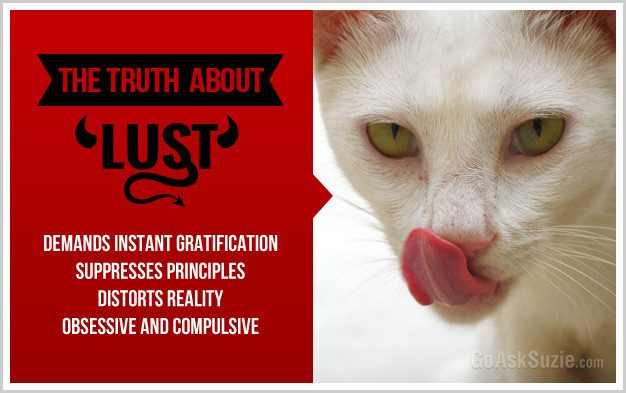
She described it like this: “Suzie, it was as if I couldn’t help myself. My emotions were so intense, I just couldn’t hold them back.”
It wasn’t until after the affair ended (along with her marriage) that Sarah realized that it wasn’t “the man” she was pursuing, as much as it was the compulsion to satisfy her lust for an all-consuming romance.
(And if lust is anything, it’s certainly all-consuming.)
An important note: In Sarah’s case (as with you… or any woman), the desire to experience a powerful romance is normal. In my opinion, there’s nothing wrong with a woman’s desire to feel those intense emotions.
So, if the “desire” for romance wasn’t the issue for Sarah (or any other woman for that matter), then what was? When a natural desire turns into an unhealthy lust.
How do you know when you’re dealing with lust and not just a natural desire? Here are some clues:
- Compulsiveness — Lust twists desires into urges to get, to own and to have that demand instant satisfaction. (In other words, you can’t delay gratification.)
- Suppression of Principles — Lust is willing to lie, cheat, or steal in order to get what it wants.
- Distortions — Lust uses arguments that override common sense and logic.
- Obsessions — Lust becomes hypnotized by the object of desire.
Now that you know a little more about lust, I have a question to ask you: do you think you were operating under the influence of a natural desire or lust when you decided to go ahead with the affair? I want you to think about that one carefully because if you want to attain true self-forgiveness, your first step is to separate the symptoms (side effects) from the cause (source of the problem). Once you’re able to do this, you’ll be able to move on to the next step.

Remove The Obstacles to Forgiving
Remember that question I asked you earlier about what allowed you to shift from not being OK with having an affair to being OK? Are you ready for the answer? You must have encountered some sort of distortion. It was this distortion that is the real problem.
What are distortions?
A distortion is a type of thought that allows wrong actions to appear right. Distortions invert the laws of right action and disrupt the rules of common sense. They disguise or suppress the fact that wrong actions can only lead to wrong results. And because of distortions, people can become logically disoriented. They think down is up, false is true, and wrong is right. As a result of this temporary confusion, many intelligent people have unwittingly been led to making “right wrong choices.”
The right wrong choice?
That’s right. Surprisingly, this paradox happens more frequently than you might think. The “right wrong choice” is what I use to describe any action that logic, prior knowledge, and common sense tell us is wrong, but emotions (like lust) distort and tell us is right. In other words, rationally, we know it’s “wrong,” but emotionally, we believe it’s “right.”
Here are some classic examples of the right wrong choice:
- Smoking cigarettes
- Driving while intoxicated
- Using illegal drugs
- Having affairs or cheating
In most of these cases, people know their actions and habits are wrong (and sometimes even dangerous), but they do them anyway. Often, they don’t even understand why themselves because if they knew better, then why in the world don’t they do better? The answer is found in the “fun house effect” of distortions. But why are distortions so effective at tripping us up? The reason is because they’re so often hidden in a familiar “Trojan horse” called excuses.
So, what’s an excuse?
An excuse is any argument that allows a false premise to appear true. This means all excuses are distortions of logic.
Think about this with me.
You’re obviously very intelligent. You know the difference between right and wrong, so it goes without saying that you wouldn’t have allowed yourself to take a wrong action without first being convinced that the action was somehow right (or would eventually come out right).
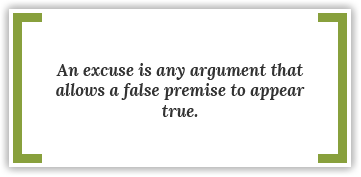
Therefore, you must have done something that made them appear right in your mind.
What could have allowed you to do that? (Only one thing I can think of: a really good excuse.)
Think about it. Somewhere along the line, you must have created (and believed) certain arguments that made it okay for you to get your desires fulfilled in a dishonest way. That line of argument is some type of excuse. Do you know what your excuses were?
Here are some common infidelity excuses (see if any rings a bell):
- I might never feel this way again, so I should just go for it.
- It’s easier to gain forgiveness than to pass up this opportunity.
- What they don’t know won’t hurt them (so as long as it’s a secret, nobody gets hurt).
- It’s my life. I should be able to do what I want with it.
- What if this is my soul mate, and I never took the chance to find out?
- These emotions are so strong, they must be destiny.
So, what were your excuses?
Well, obviously, I can’t say for sure what they were, but what I can say with certainty is this: whatever your particular excuses were, they must have been powerful because they were very effective in suppressing your principles and overriding your common sense. This is why I believe the most important thing you can do right now is to uncover those excuses.
Why is it so important to find your excuses?
It’s important because excuses are what allowed you to override your own logic, principles and even common sense. This means that as long as the excuses exist, so will the possibility of repeating the mistake.
History does not repeat itself. People repeat their histories.
This means that until you’re willing to correct the distortions, excuses and rationalizations that led you into trouble, you will continue to feel guilty.
Now, you must ask yourself, what exactly do you need to correct at this point?
Is it your past actions (flirting, texting, late night calls, sex, or emotional attachments)? Or is it the excuses that led to those actions?
You guessed it.
What needs to be corrected are the excuses that allowed you to rationalize… that “wrong” could somehow lead to “right.” Therefore, the excuses and rationalizations are the real problems (mistakes) that call for correction.

Embrace Correction to Self-Forgiveness
What is self-correction? It is the process by which you learn how to correct the thinking that leads to mistakes.
The two keys to self-correction:
- Finding the excuses that lead to wrong actions
- Releasing those excuses (deciding to never believe them again)
Key #1: Remember those pesky little things that distort logic… called excuses? Well, the first thing you’ve got to do is find and remove them! You’re going to have to be willing to take a good hard look at all the excuses that allowed you to go ahead with the affair. You have to be willing to eliminate all those good-sounding rationalizations that caused you to override your own logic and common sense.
Why is this process so important to self-forgiveness?
That’s a good question because this is how you discover exactly what needs to be forgiven and corrected. Here’s the thing: it isn’t the attraction you felt or the desires you had, or even the behavior that resulted from those feelings; rather, it’s the excuses that made it okay for you to indulge them that you need to correct (discard).
Hopefully, this is making sense to you.
Because the instant you begin to follow the thread of an excuse, you become like Alice in Wonderland tumbling down the rabbit hole where up is down, right is wrong, night is day, and hate is love. You’d be shocked at just how deep the rabbit hole goes and how many twists, turns, distortions, rationalizations, and denials one tiny excuse leads to. However, in the end, all excuses have this one thing in common: the ability to distort and stop you from seeing the true consequences of your actions. So, after you’ve taken a thorough inventory of the excuses that helped lead you into the affair, I want you to mentally release all those excuses.
Let’s get that process started right now. (Go grab a pen if you don’t have one already and do the following exercise.)
Here’s what I want you to do:
Make a list of the top five excuses you used to justify, rationalize, and make it okay to override your better judgment and move forward with the affair.
The key here is to be fiercely honest as you compile your list.
Remember, an excuse is any argument that allows a false premise to appear true.
The primary role of the excuse is to distort logic in order to justify making wrong feel right. It’s time to roast all the sacred cows.
In other words…
Now is no time to BE LOYAL to your excuses.
Instead, I want you to rat them out, bring them out of the dark and expose them to the light of logic. Do this, and you’ll soon discover that these excuses are like the monsters under the bed: they only have power if you don’t confront them.
Did you make that list?
If not, stop and do it now.
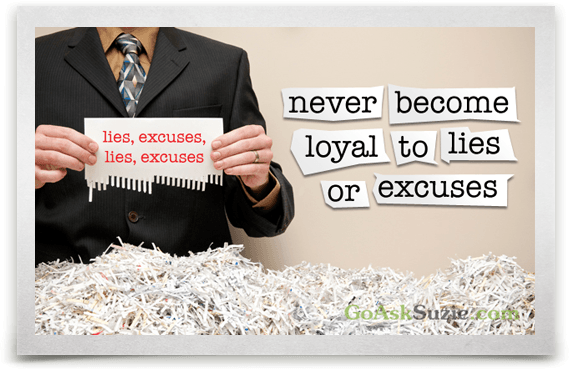
Key #2: Release ALL those excuses as you make a true and irreversible decision to never believe any of them again.
This is important because basically, ALL excuses are lies. They are false arguments. So, anytime you choose to believe an excuse, you’re simultaneously choosing to deceive yourself. And this is why you can never deceive any person without first deceiving yourself. Do yourself a favor and release those excuses now.
Here’s what I believe:
A person without excuses is a person without limits!
Think about it. If you hadn’t had any of these excuses to justify the affair, would it still have happened? Hmmm… Something to think about, right? In other words, a person can do anything, hurt anyone, cause all kinds of mayhem, madness, and destruction IF they have a strong enough excuse to justify their actions. But on the other hand, you can do anything, go anywhere, and be anyone… as long as you have no excuses to stop, block, or distort you.
What does this tell you?
Excuses are the real problems, and therefore, you need to discard them.
If you don’t believe me, ask yourself the following question:
“What would my life be like right now if I had no excuses stopping me from doing the right things? How much could I improve my body, my finances, and my life… if I truly had no excuses to block me or distort reality?”
It’s a pretty intriguing thought, isn’t it?
Now that you’ve released the excuses that lead you into trouble, it’s time to take the final (and most important) step.

Accept Forgiveness for Your Mistakes
Let’s begin by defining what self-forgiveness really is.
Here’s my definition: self-forgiveness is the act of accepting forgiveness for our mistakes. This includes the excuses that led to making those mistakes in the first place and the negative consequences they may have caused.
Here’s another thing about self-forgiveness:
It’s not a theory; it’s an experience. By forgiving yourself, you open the door to the mental and emotional prison you created for yourself. You literally set yourself free. This means as you forgive yourself, you stop punishing yourself, you stop beating yourself up, you stop the self-loathing, guilt, blame, and shame, and you stop feeling like you have to try to pay back for making the mistake. Let’s begin that journey now.
This step is actually divided into two parts:
- Removing the obstacles to forgiveness
- Embracing learning success
Part One: Removing the Obstacles to Forgiveness
Before you can forgive, it’s important that you remove two obstacles that block you from accepting forgiveness:
Obstacle #1 — Believing you don’t deserve forgiveness
Obstacle #2 — Believing mistakes call for punishment
Let’s tackle the first obstacle…
Believing You Don’t Deserve Forgiveness
This obstacle is a biggie for many people. Even if you can see the excuses that rationalize the affair, you may not be able to move to the next step because an even bigger excuse is standing in your way. It’s an excuse that has you convinced you don’t deserve forgiveness for your mistake. You’d be surprised how many deeply-held beliefs we have and hold on to about why we don’t deserve forgiveness for our mistakes. Some people have lists as long as my arm. What I’m hoping to do at this point is help you see that there are far more reasons why you deserve forgiveness than why you don’t. Let’s see how many we can find in 20 seconds or less. (Start your clock.)
You deserve forgiveness because:
- We are all mistake-makers.
- You didn’t invent any of these excuses.
- Perfection isn’t a part of the human experience.
- Mistakes are lessons still waiting to be learned.
- You are not the exception; you’re the example of what it means to be human.
- Failing or falling short is feedback, not facts.
- Because mistakes are human, forgiveness MUST BE the antidote.
Here are some things to keep in mind about mistakes:
Mistakes are learning opportunities. They can teach. They can help us improve and provide feedback. In other words, mistakes can have some really constructive side effects. But alas, few of us were raised to think of mistakes in such a positive light. In fact, as children, most of us were punished for our mistakes — not rewarded. But why do we believe in punishing mistakes (and mistake makers)? You guessed it! We do it because we’re hoping that punishment will lead to correction. The intriguing follow-up question to this assumption is this: does it really work? Does punishment really lead to correction? (Something to ponder.)
So, what happens when it’s YOUR mistake and you hold the belief that “mistakes a call for punishment”? My guess is that’s exactly what you’ll do. In other words, you’ll either put yourself in a position to be punished by others… or you’ll punish yourself.
What Is Another Word For Self-Punishment?
That word is guilt.
If you’re experiencing any of the sensations of guilt over this mistake, then what you’re really doing amounts to punishing yourself for your own mistakes. What’s the point of all this guilt? Here it is: you’re hoping that by punishing yourself with guilt, it will prevent you from making any more mistakes and force you to pay for having the affair. The question to ask yourself now is this: does guilt really lead to correction? Does feeling guilty really stop people from having affairs?
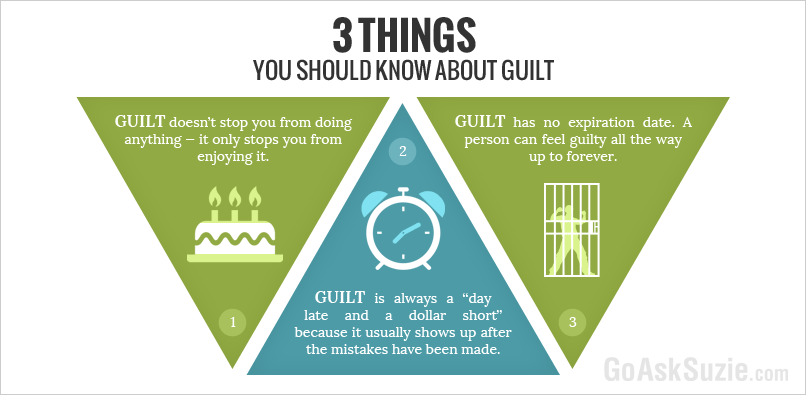
The honest answer? No, it doesn’t. In fact, it does quite the opposite.
Things to understand about guilt:
- Guilt doesn’t stop you from doing anything — it only stops you from enjoying it.
- Guilt is always a “day late and a dollar short” because it usually shows up after the mistakes have been made.
- Guilt has no expiration date. A person can feel guilty all the way up to forever.
And perhaps the biggest problem with guilt:
While guilt chains you to your mistakes, it does NOTHING to help you correct them. As a matter of fact… I’m willing to go out on a limb and say… as long as you’re choosing to self-punish with guilt, you’re also choosing NOT to self-correct.
Think about it.
If you knew beyond the shadow of a doubt that you had corrected the thinking that led to the mistakes, then what do you have to feel guilty about? You got it — nothing. Because your mistake would have become a teaching device. Something to be grateful for, rather than feel guilty about. I suggest you discard any ideas or notions from your mind that your mistakes call for punishment. Instead, recognize that mistakes (yours and others’) call for correction. And once you do this, you’re ready to embrace the final step in your journey: learning success.
The Final Step: Embracing Learning Success

The key that unlocks the door to your mental and emotional freedom is learning how to learn from your mistakes. This is the true secret of self-forgiveness.
It’s the recognition that mistakes are teachers, NOT terrorists. Once you have truly made this shift in perception, then self-forgiveness is automatic.
How can self-forgiveness be automatic?
Think about it like this: everything in the natural world has its counterpart. Day has its night. Light has its dark. And up has its down. Because mistakes are natural, they too have a counterpart: forgiveness. Therefore, the reason for forgiveness is mistakes. When you embrace the fact that your mistakes are teachers, you transform them into stepping stones.
Bottom line?
Self-forgiveness is really a shift in perception. It’s a re-frame on how you look at mistakes (your own and others’). And the moment you become willing to embrace learning success from mistakes, then the shift happens in a heartbeat.
I leave you with some gentle reminders:
- There is no hierarchy in forgiveness, no special exclusions, no exceptions. It’s for one, and it’s for all. Think about it. If forgiveness had exceptions, would it really be forgiveness? Nope. It would not.
- Forgiveness is like love, grace, or mercy itself. It can’t be earned. It has no limits and no boundaries. There are no exclusions. There are no conditions. There are no exceptions.
- God forgives! (That’s His job.) If there’s a heaven, ALL its citizens are mistake-makers. If that’s not the case, then heaven is empty.
Your job?
- Correct the thinking that led to your past mistakes
- Embrace lessons and set yourself free
Can you do that… for me? (I know you can.)
On behalf of all your fellow human beings and mistake-makers around the world, I thank you from the bottom of my heart. I thank you for opening your heart and embracing forgiveness for yourself. I thank you for loving yourself enough to let go of your mistakes. I thank you for being willing to learn the lessons they teach.
And I’m thankful for a very good reason…
Because part of what I know is this: people who embrace forgiveness for their mistakes are more willing to forgive others for theirs.
Since we all live in this world together, I’m glad you’re willing to forgive yourself.
Until we speak again…
Remember… Love Wins!

And by the way… if you would like to get the very best help I have to offer you in ending an affair, then you’ll want to check out my New End the Affair online program.





